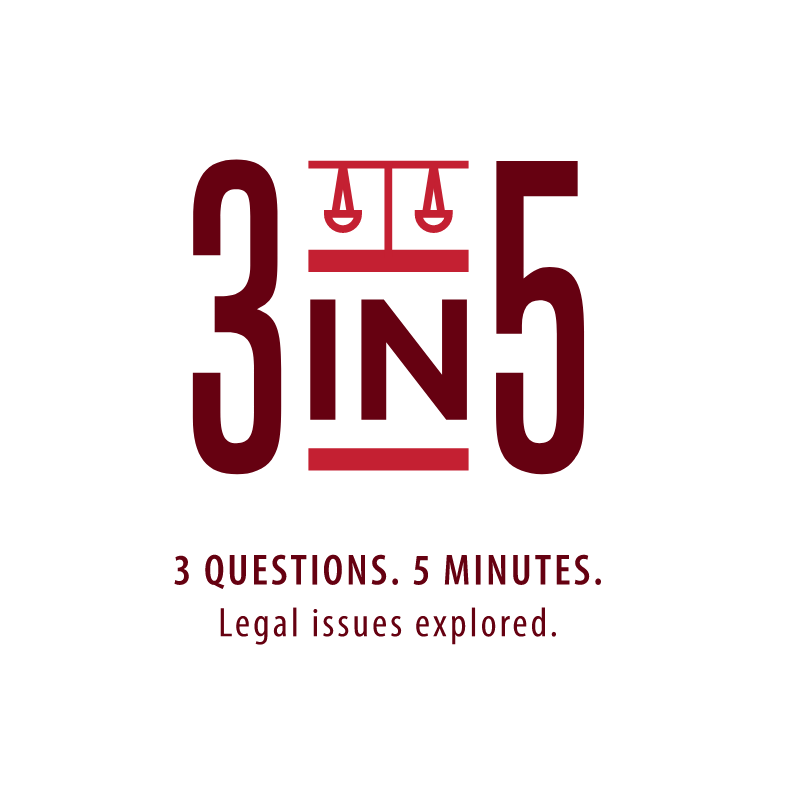
Jorge Contreras: At the current rate, estimates are that it’ll take four years for the whole world to be vaccinated, which is probably too long.
Diane Maggipinto: This is 3 in 5. I’m Diane Maggipinto, the host of this podcast, three questions in five minutes from the S.J. Quinney College of Law at the University of Utah. My guests today
Jorge Contreras: Jorge Contreras, presidential scholar, and a professor of law at the University of Utah S.J. Quinney College of Law.
I have an adjunct appointment in the Department of Human Genetics at the University of Utah School of Medicine.
Diane Maggipinto: The research is titled “The Open COVID Pledge: Design, Implementation, and Preliminary Assessment of an Intellectual Property Commons” on which you worked with six other experts. What is the research about?
Jorge Contreras: There’s a lot more to it than just a paper. It’s a bigger idea and a bigger project in that. It’s about commitments of intellectual property to public causes. It’d be useful for COVID-19, but also has applications beyond that. Patents, especially, are used to block others from utilizing a particular technology, but that becomes problematic sometimes, for example, during a pandemic.
When public health goal is to make technology available as broadly as possible. That can be either hospital equipment like ventilators, PPE, like, uh,N-95 respirators, vaccines, therapies. All of these are covered by patents and other intellectual property rights. And the idea of this project was to try to figure out a framework that companies and institutions could use to make their intellectual property more broadly available to respond to the pandemic.
Diane Maggipinto: What does this matter? Why, why is there a need for this?
Jorge Contreras: One obstacle that we can’t overcome is IP holders just not wanting to do this, right? This is a voluntary program that we’re talking about, but even for those who want to do this and want to help in some way, there’s not an easily accessible standard way of doing this.
Intellectual property rights are designed to enable you to stop others from doing things, but they’re not easily designed to allow you to authorize others, to do things, to do that. You need licenses and permissions. These are labor intensive. They require lawyers. They require agreements that are 10, 20, 30, 50 pages long.
And for purposes of quickly responding to the pandemic. We wanted to create a framework that would be easy to use, easy to understand, very rapid and self-executing so that companies could just do this. They could put IP rights out there without having to go through a lengthy negotiation process and more importantly, so that users could just start using the intellectual property without hiring lawyers and negotiating lengthy.
Diane Maggipinto: Tell us about the open COVID pledge.
Jorge Contreras: The framework that we put together last, during the duration of the WHO declared COVID-19 pandemic with a one-year ramp-down period at the end of it. We weren’t asking companies to give up their intellectual property forever. Just commit it to more public use during the pandemic to respond to this particular emergency. The intellectual property pledge is really nothing more than a public commitment that an IP holder makes that binds it through some sort of license, right? A legally binding agreement to make IP available to others for some specified user purpose without charge. And that last part is probably the most important of these is licensing agreements often will bear royalties, money that has to be paid for this limited purpose.
The idea was that things be made available for free. What we found with the open COVID plan, which was launched a year ago, was that different industries and markets responded in very different ways to the idea of sharing intellectual property. We got an estimated 500,000 patents pledged by very large companies, but mostly in the digital innovation sector. Companies that have a surprising amount of IP relevant to emergency response, contact tracing, a disease modeling epidemiology, but they’re not biopharma companies.
Diane Maggipinto: Do you think that’s indicative of what will happen now and moving forward?
Jorge Contreras: Right now, of course, the big issue with the pandemic is vaccine distribution around the world.
At the current rate, right? Estimates are that it’ll take four years for the whole world to be vaccinated, which is probably too long. There’s been a lot of pressure on vaccine manufacturers, especially, to share their IP, share their know-how to, uh, accelerate the deployment of vaccines around the world.
And Moderna one of the major vaccine manufacturers did pledge its patents to the COVID-19 effort, not through the open COVID pledge, through its own pledge, but in a very similar way. Other vaccine manufacturers could do that. And so, we who created the open COVID pledge are working with the universities aligned for essential medicines and others, to try to convince some of the holders of IP in this technology to at least make it more broadly available for that purpose.
Um, one of the really remarkable things about the open COVID pledge and pledging now is that the impetus is really much more altruistic, I think. The companies who have made these pledges don’t expect a direct financial return, and there’s obviously public goodwill, employee goodwill, goodwill with the government that are intangible benefits.
So this is really encouraging.
That’s 3 in 5, from the University of Utah S.J. Quinney College of Law.
